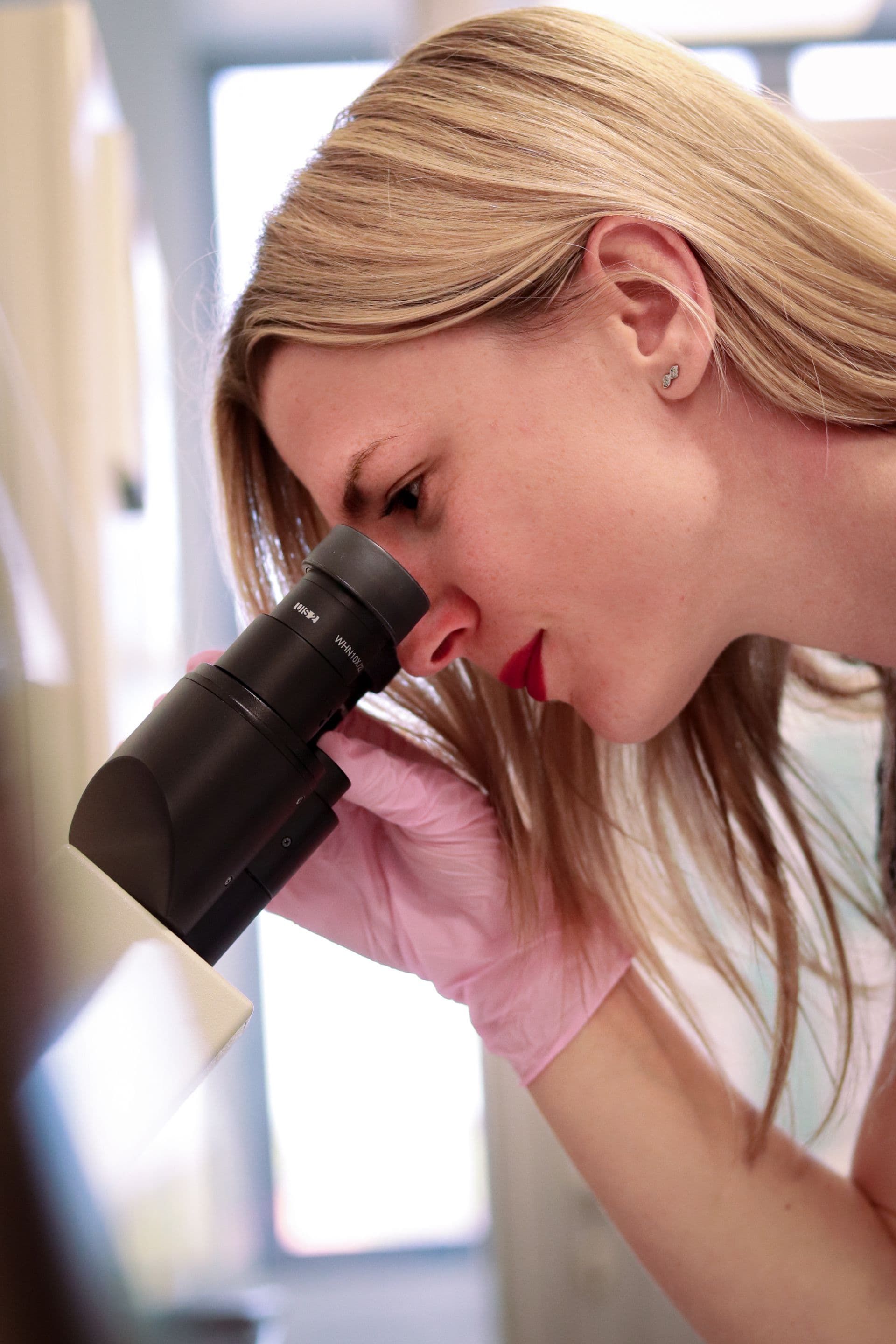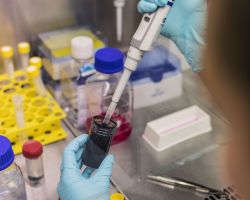Polypyrrole: A conducting polymer affecting neurogenesis
8 April 2022 Polymeric materials are often known to the public more as insulating materials, i.e. those that do not have the ability to conduct electricity. However, there is a group of polymers in which single and double bonds alternate regularly in the structure.
It is this conjugated structure that allows the movement of free electrons along the chain and is linked to their electrical properties. Applications can be found, for example, in the electronics industry as well as in tissue engineering thanks to the biocompatibility of conductive polymers. The Biomaterials Research Group at the Centre for Polymer Systems has this time focused on testing the biological properties of one of the members of the group of biocompatible materials, which is polypyrrole. “In tissue engineering, conductive polymers are mainly used in the context of electrosensitive tissues such as cardiac or muscle tissue. Electrosensitive tissues will react more sensitively and naturally to electrical signals and stimuli as they are exposed to such stimuli in the body,” explains Kateřina Skopalová, a member of the Biomaterials Research Group. For this reason, scientists have focused on investigating the effect of polypyrrole on embryonic stem cell neurogenesis. “Polypyrrole was interesting to us not only because it is a conductive polymer used in tissue engineering, but also because heterocyclic pyrrole is the default material for the synthesis of polypyrrole since pyrrole and its derivatives serve as pharmacologically active substances, which include, for example, antidepressants, antivirals and others,” adds Kateřina Skopalová. To date, no scientific publication has been published on the effect of low-molecular weight products released from polypyrrole into the environment on cell behaviour. However, the Biomaterials research team at CPS has been able to demonstrate the presence of such substances in polypyrrole extracts and subsequently demonstrate their effect on embryonic stem cell behaviour, specifically their effect on neurogenesis. The study was published in the International Journal of Molecular Sciences, one of the world’s most respected scientific magazines. “The results of the study are very important as they show that the use of polypyrrole can spontaneously promote the formation of nerve cells. In its use in the field, it is therefore essential to take this aspect into account in the target application”. Young environmentalists met in Otrokovice 4 April 2022 On Friday, 25 February 2022, a regional conference was held at the Secondary School of Industry Otrokovice. Entitled Enersol 2022 and coupled with a competition of student projects the project aims to support the education of secondary school students and teachers on renewable energy, carbon footprint reduction and water & waste management. The Enersol project in the Czech Republic has been running for nineteen years. In the Zlín Region, it has been implemented for 16 years by the Secondary School of Industry Otrokovice, which also cooperates with the Centre for Polymer Systems of the Tomas Bata University of Zlín. The purpose of the student project competition is to familiarise students with the issue, to teach them how to advocate their ideas and express/defend their own opinion in front of the public. Most frequently, students choose the topic of their work based on the field they are studying or which is close to them for some other reason. In the Zlín Region, papers prevail on reducing the carbon footprint of vehicles, ecological housing in connection with savings in the heating costs of buildings or growing energy crops. The year 19 of the competition involved seven secondary schools, whose students produced thirty-two papers. The top fourteen were then presented at the regional conference. “I am happy to see that the Zlín Region has long been rated as one that raises the bar in terms of the number of projects and their quality. This shows that our young people are not indifferent to environmental issues,” said Libor Basel, director of the Secondary School of Industry in Otrokovice. The paper produced by Pavel Ilčík and Aleš Šenkár, students of the Secondary School of Industry in Otrokovice, and entitled Biodegradable Polymers; it addressed the decomposition of planting pots in soil. In the Enersol and Innovation category, the jury was most attracted by the project called Recuperation = Healthy and Economical Housing by Petr Makový from the Secondary School of Industry and Construction in Valašské Meziříčí. Vendula Pochylová from the Secondary School of Industry, Hospitality and Healthcare in Uherské Hradiště placed first in the Enersol and Popularisation category with her almost six-kilogram cake. From the national round, one winning project per region will be selected and presented at the international conference organised by the Secondary School of Industry in Otrokovice and held at Otrokovice’s Beseda in April.




